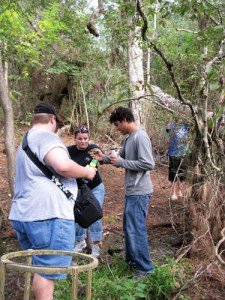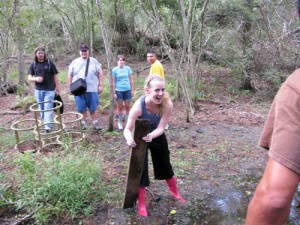Cache in, trash out
Preservation and adventure in geocaching
Todd Blair
The Signal Staff

FROM LEFT: The Signal staff, Matt Griesmyer, Caroline Fry and Armand Shafaii, help each other cross through the mud behind the Arbor Building.
Geocaching is a high-tech game of hide and seek played around the world by adventure seekers equipped with GPS devices. The basic idea is to track down and locate hidden containers, called geocaches, and then share your experiences online.
“Geocaching participants include a large variety of people from all age groups,” said Jen Sonstelie, spokeswoman for Groundspeak.com. “There are significant groups of families with children, college students, adults and retirees that enjoy geocaching.”
The word Geocaching stands for GEO, for geography, and CACHING, the process of hiding a cache. Cache is a term used by hikers and campers as a hiding place for concealing and preserving supplies and food.
“Since September of 2000, geocaching has grown from 75 geocaches to over 900,000 active geocaches worldwide,” Sonstelie said. “We estimate that there are between 2 and 3 million active geocaching participants around the world.”
One way that geocachers stay in touch with each other is through the organization’s online forums at www.geocaching.com. The forum presents participants with a way to provide feedback anonymously.
“I got back into hiking three years ago,” one member said. “I bought a Garmin Vista HCX. The instruction booklet mentioned geocaching when referring to certain features. I looked it up. I was very excited to see that there was a cache near my house. It was a good few weeks before that ‘there are these hidden items all around us!’ feeling wore off.”
A common practice for geocachers is “Cache In Trash Out” where in the process of hunting for the cache, participants clean up the trash in the area along the way. CITO is an ongoing environmental initiative supported by the worldwide geocaching community.
Geocachers have always been dedicated to cleaning up parks and other cache-friendly places around the world; helping to preserve the natural beauty of our outdoor resources.
Participants are encouraged to practice CITO on every geocache adventure.
As stated on geocaching.com: “You should bring a trash bag along with you on your walks in the woods and pick up the occasional piece of trash you see on the trail. Even this small act can make a huge difference.”
Geocaching is a process of catch and release. When participants find a cache, they are supposed to leave whatever they find behind and/or leave something of equal or greater value so there is still a cache in place for other geocachers to find.
There are a wide variety of cache “treasures.” A cache can be something as simple as a container with a logbook in it. Some caches contain items such as toys, trinkets, jewelry or even money. One cache contained a rock from a Mount Everest Base Camp.
In most cases, a cache contains a logbook. The logbook contains information from the owner of the cache, notes from other geocachers and, often, valuable, rewarding and entertaining information.
The caches are located in hidden places all over the world, including three sites on the UHCL campus.

FROM LEFT: The Signal staff, Christopher Curry, Matt Griesmyer, Lindsay Humphrey, Daniel Benitez and Cristine Crump, cache in and clean up the woods behind the Arbor Building.
A group of students on the newspaper staff recently went caching in the woods behing the Arbor Building and found all three caches after several hours. Students found Jamaican coins, buttons and even a toy snake in one of the caches — and lots of trash.
While they were searching for the caches, the students practiced CITO, cleaning the woods behind the university on their search.
“I had a great time looking for the caches,” said Christopher Curry, assistant editor. “I’m interested in searching for more caches around the Houston area.”


Comments are closed, but trackbacks and pingbacks are open.